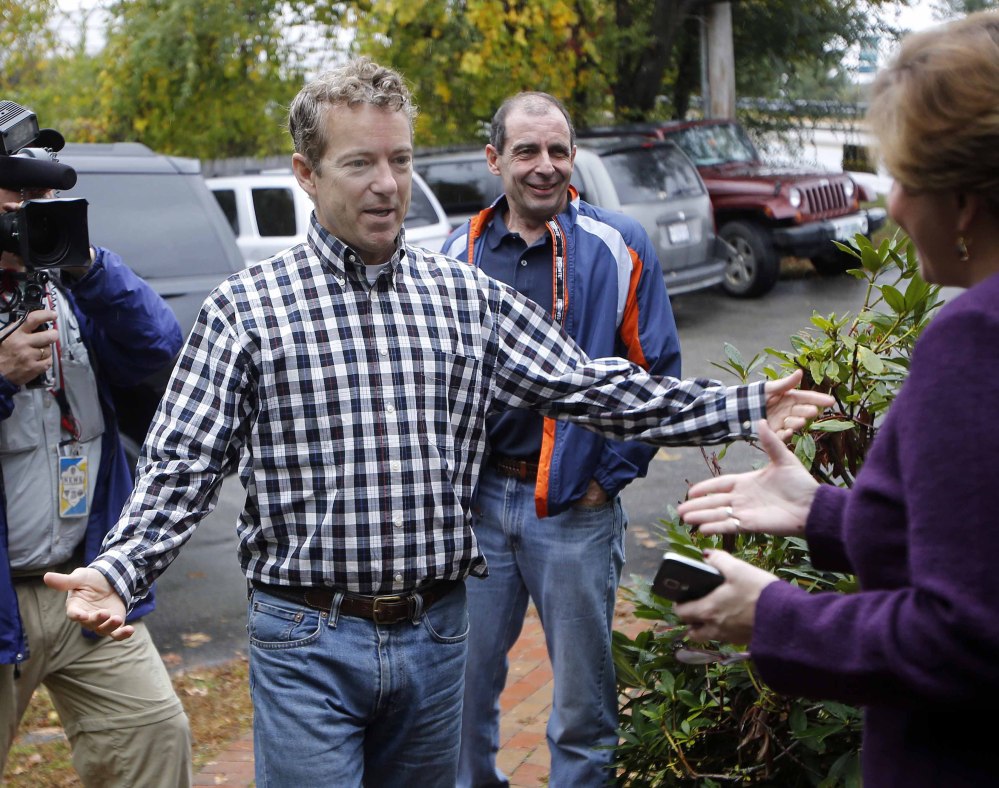CONCORD, N.H. — In his third trip to New Hampshire this year, U.S. Sen. Rand Paul of Kentucky on Thursday continued building a network of support – with a heavy focus on young votes – for a possible 2016 presidential run.
Paul spoke to mostly high school and college students in Concord about the need to elect Scott Brown to the U.S. Senate and addressed a packed auditorium at Plymouth State University. As Paul travels the country this year – he has been to 32 states – he is working to expand the Republican Party’s base to include young people and minorities, constituencies that Republicans have had trouble attracting.
With its first-in-the-nation presidential primary, candidates like Paul who may seek their party’s nomination know it’s critical to do plenty of face-to-face campaigning.
“I think the neat thing about New Hampshire is that it’s a small enough state that people not only want but seek out personal interaction with the candidate,” Paul said during a stop at the New Hampshire Republican Party headquarters in Concord. “So when I call people on the phone here at the headquarters, I think people aren’t that shocked.”
Although he says he will decide whether to run for president in the spring, Paul already is building a ground game in New Hampshire to help spread that message and attract early supporters. In July, Paul hired veteran New Hampshire strategist Mike Biundo to run his PAC’s efforts here. Biundo managed Rick Santorum’s 2012 campaign for president and says he and his team are “starting to build a statewide, grassroots network” of Paul supporters. Texas Gov. Rick Perry is the only other possible 2016 candidate with a staffer in New Hampshire, longtime Republican lobbyist Mike Dennehy.
As Paul tries to carve out a national profile, he is continuously linked to his father, Ron Paul. A Dartmouth College student told Paul that he began following Ron Paul in seventh grade. In New Hampshire, the shadow of his father could help Paul – Ron Paul took second in the 2012 New Hampshire primary, largely by engaging the grassroots supporters Biundo and his team are now trying to tap into. There is a risk, though: Some of Ron Paul’s libertarian viewpoints have alienated voters.
“I think people are starting to understand both similarities and differences. And, you know, I’m proud of my dad,” Paul said. “How many kids in 7th grade are eager to follow a candidate?”
Widening the party’s base, Paul says, also means reaching out to minority voters and allowing for differences of opinion on social issues. Paul has talked to minority communities about the need to reform prison and drug laws and spoke out against the militarization of police after an unarmed black 18-year-old was shot by white police officers in Ferguson, Missouri.
“We are trying to go to places to let people know that we do have a message and we do have a competing plan for trying to cure poverty,” Paul said. “The question that voters have to ask is: Democrats say they care about you, but has your lot in life gotten any better?”
Send questions/comments to the editors.



Success. Please wait for the page to reload. If the page does not reload within 5 seconds, please refresh the page.
Enter your email and password to access comments.
Hi, to comment on stories you must . This profile is in addition to your subscription and website login.
Already have a commenting profile? .
Invalid username/password.
Please check your email to confirm and complete your registration.
Only subscribers are eligible to post comments. Please subscribe or login first for digital access. Here’s why.
Use the form below to reset your password. When you've submitted your account email, we will send an email with a reset code.